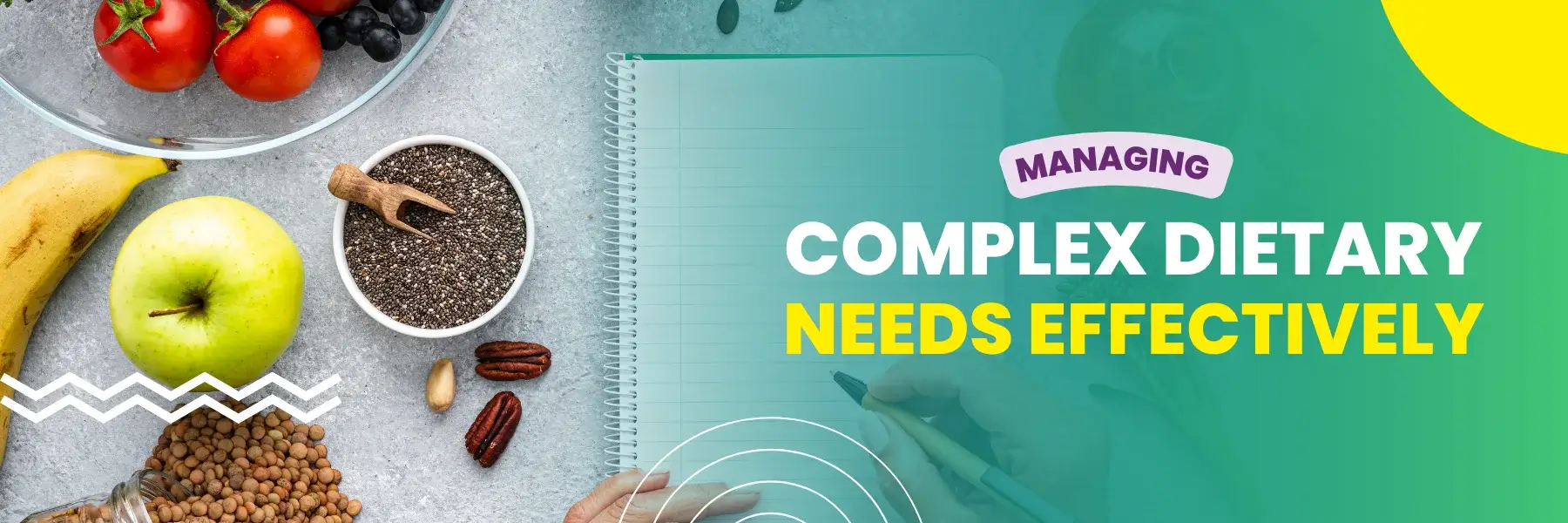For many people with disabilities, managing complex dietary needs is a daily challenge, requiring support from NDIS. Supported Independent Living is a highly valued service that can provide specialised enabling support to manage these dietary needs well. This article will consider how SIL could support people with complex dietary requirements, allowing them to participate in and manage everyday life.
Understanding Complex Dietary Needs
Complex dietary needs often arise due to food allergies, intolerances, metabolic disorders, or chronic illnesses. For instance, a patient with celiac disease should be on a gluten-free diet, whereas in diabetic patients, carbohydrate intake should be monitored very carefully.
Handling such nutritional requirements in their diet goes way beyond just avoiding certain foodstuffs. This usually involves careful planning, understanding nutritional composition, and at times requires special food preparation. That is where SIL comes in. The SIL providers handle several areas of service provision to help the clients through their dietary needs while encouraging independence for an improved quality of life for the clients.
Role of SIL in Managing Dietary Needs
1. Personalised Meal Planning
One of the ways complex dietary needs are supported by SIL is through individualised meal planning. SIL providers ensure meals are prepared according to dietary restrictions, such as limiting sodium intake while exploring alternative seasonings.
2. Food Preparation and Cooking
Preparing food that meets complex dietary needs often requires specialised techniques and knowledge. SIL providers provide support with food preparation and cooking to ensure the nutritional value of the meal as well as safety for the participant to consume. This could include the use of special kitchen equipment, cross-contamination avoidance, and specific methods of cooking to preserve nutritional value.
3. Grocery Shopping and Procurement
SIL services will also assist participants with grocery shopping, including procuring special food items. These services are particularly helpful if a participant needs certain foods due to diet reasons or needs to buy a certain brand of product. SIL providers can help make lists, escort participants to the grocery store, and search for items that may be hard to find to ensure participants have the foods they need.
4. Education and Training
While such dietary needs are difficult and sometimes impossible to understand and manage, SIL providers offer education on food safety, reading nutritional labels, and making informed food choices, helping participants manage their dietary needs independently. This also includes teaching the individual about nutritional labels, food safety practices, and how to make informed food choices. With this knowledge, participants can better manage their dietary needs independently.
5. Monitoring and Adjustments
As health conditions change or personal preferences shift, SIL providers continuously monitor and adjust meal plans to ensure participants receive the right support. SIL providers provide ongoing monitoring and changes in meal planning and dietary support for the individual. This will ensure that any change in dietary need is promptly met, and the participant continues receiving that specific support. Regular check-ins and assessments will keep a dietary management plan functional.
6. Integration with Other Supports
SIL services are designed to work in complete harmony with other support services, such as health and therapy. This holistic approach ensures dietary management is part of a coordinated care plan. For example, should a participant receive nutritional therapy or be working with a dietitian, the SIL provider will work with these professionals ensuring the nutrition plan aligns with the participant’s overall care and health goals.
Benefits of SIL in Dietary Management
SIL thus offers many advantages in complex dietary needs management and contributes greatly to the overall well-being of participants. Some of the key benefits accruing from SIL include:
1. Improved Lifestyle
SIL provides person-centered dietary support for participants who have complex food requirements. Participants with the same kind of food requirement can enjoy sharing meals that would have satisfactorily met their nutritional and preference needs, thus improving their conditions and increasing satisfaction.
2. Increased Independence
Such skills and knowledge are provided by SILs services, thus enabling them to be independent in managing their diets. Indeed, through personalised meal planning, cooking assistance, and education, participants learn more self-reliant ways to manage their diets.
3. Reduced Stress and Burden
It is a complex need that can be a significant source of stress and even feeling overwhelmed. SIL providers reduce this level of stress by managing complicated meal planning, preparation, and shopping, freeing the participant to devote time and energy to other areas of their life.
4. Improved Health Outcomes
Good health is better maintained when complex dietary needs are appropriately managed. SIL services ensure that participants receive appropriate nutrition and do not ingest harmful substances, thereby ensuring improved overall health.
5. Supportive and Responsive Care
SIL providers support the participants with responsive and enabling support that caters to the individual customised needs of each participant. Such an approach helps in giving dietary support effectively and also makes sure to adapt to changes in health or preference.
6. Smooth Integration with Other Supports
The role of the SIL providers is to work with other support services in conjunction, contributing to the holistic care plan of the participant. In this manner, SIL supports dietary management in a more holistic, integrated approach.
How Do You Access SIL Services for Dietary Management Help?
To access SIL services for dietary management help, several steps are to be followed:
-
Contact an NDIS Planner or Coordinator
It is best to contact your NDIS planner or coordinator to discuss your dietary requirements and options for SIL. Your planner or coordinator will be able to tell you how many SIL providers are available, which will give you an idea of which one will best meet your needs.
-
Choosing a SIL Provider
Research the SIL providers who can offer the specific dietary support service you require. This includes experience in dealing with complex needs diets, their philosophy concerning personalised care, and performance regarding providing service for people with similar needs.
-
Develop a Support Plan
Develop a support plan with your chosen SIL provider, outlining your needs and preferences concerning diet. The support plan must specify how meal planning is performed, how food is prepared, how groceries will be bought, and other relevant features of dietary management.
-
Start Services
Once the support plan is implemented, your SIL provider will deliver services according to the agreed-upon plan. Ongoing reviews and adjustments will ensure that dietary management is effective and meets your changing needs.
-
Provide Feedback
Continued open and ongoing communication with the SIL provider will help to ensure the re-assessment of dietary support relevant to your ongoing needs. Please remember to provide feedback and any adaptations required to meet the best possible outcomes.
People who would be interested in being directed to a trusted NDIS provider for diet management may call Provider 24. They can assist you in finding the appropriate SIL provider that best suits your dietary needs, and they are also able to guide you through the whole process.
Conclusion
SIL or Supported Independent Living is one of the means where complex dietary requirements of the participants of the NDIS are concerned. With SIL providing personalised meal planning, food preparation, grocery shopping assistance, education, monitoring, and integration with other supports, people find it easier to access and manage their dietary needs. As such, SIL provides one of the highest benefits toward further quality of life, higher independence, and better health.
If you or someone you know needs assistance with complex dietary needs, Provider 24 can connect you with trusted NDIS providers who will ensure you receive the support necessary to manage your dietary needs and enhance your well-being.




